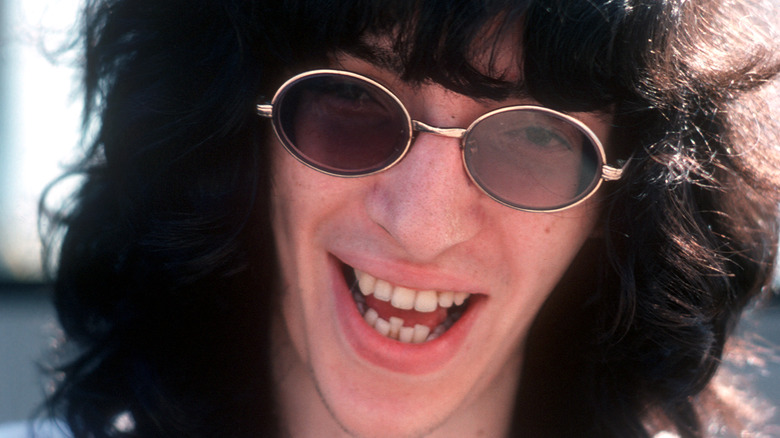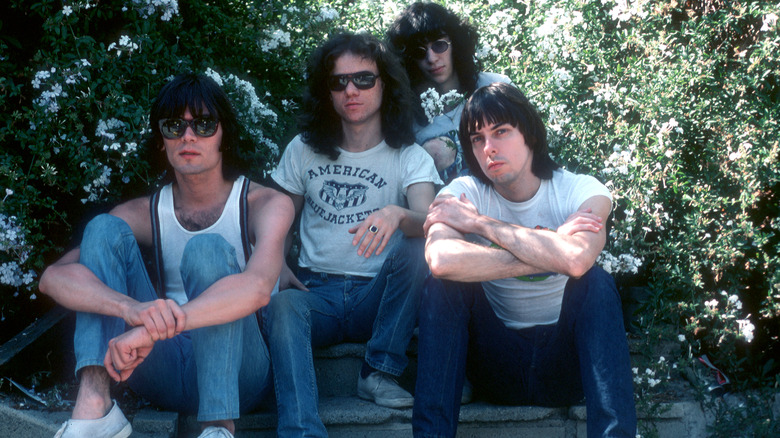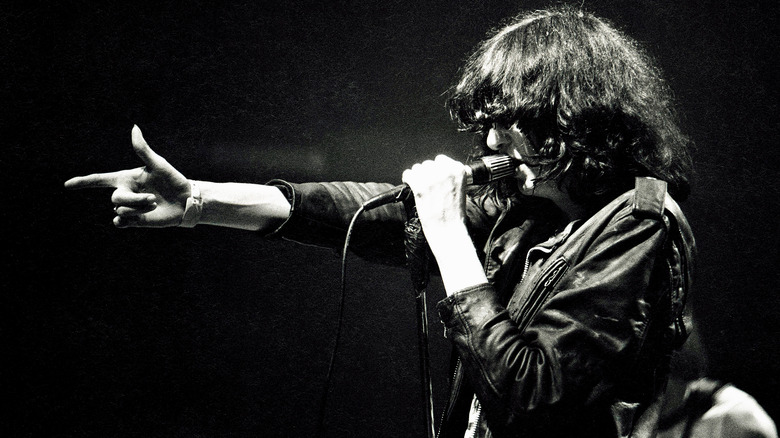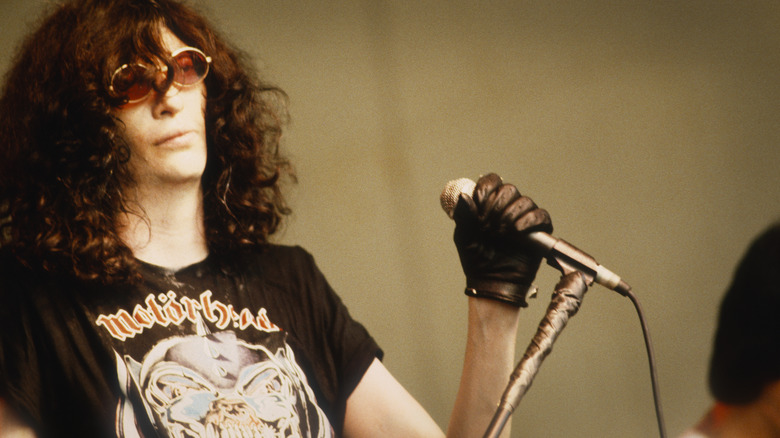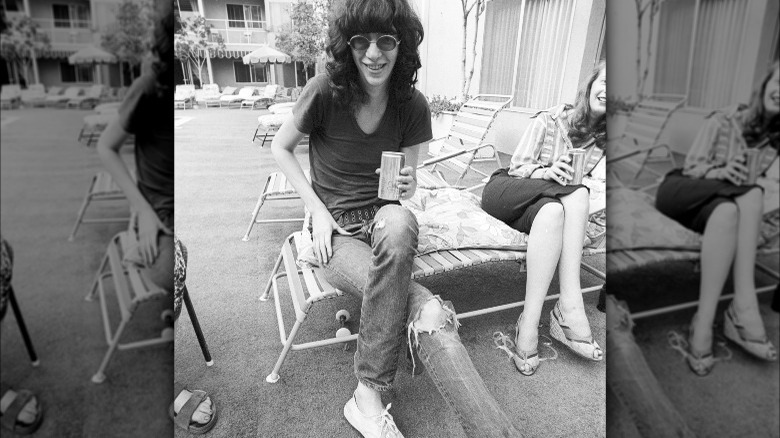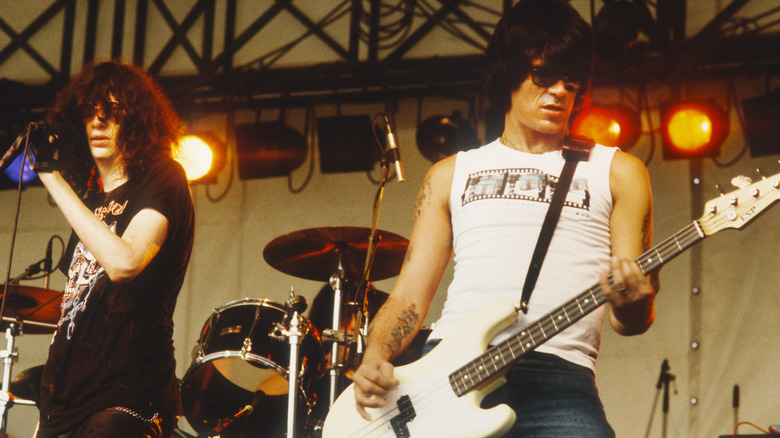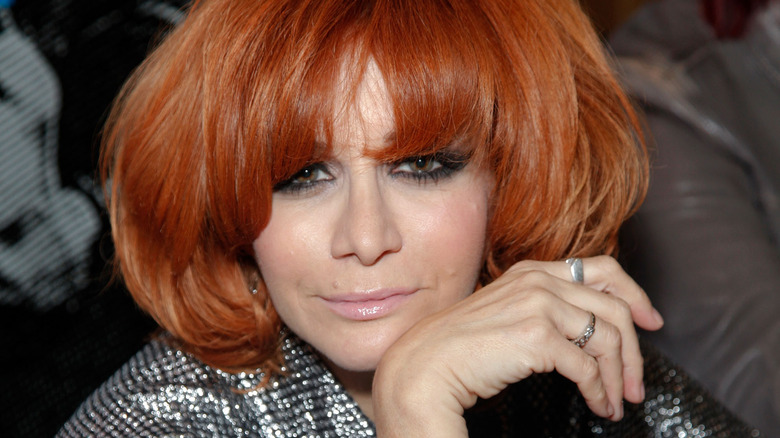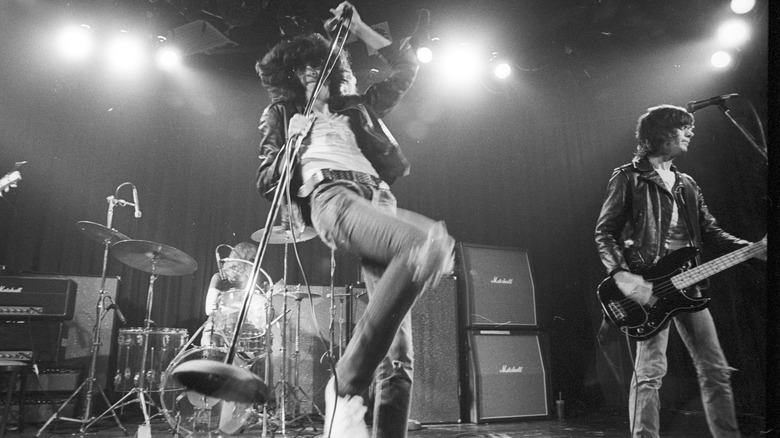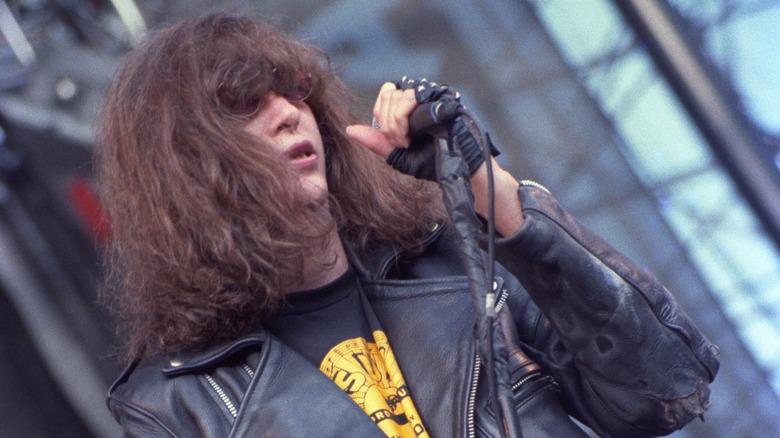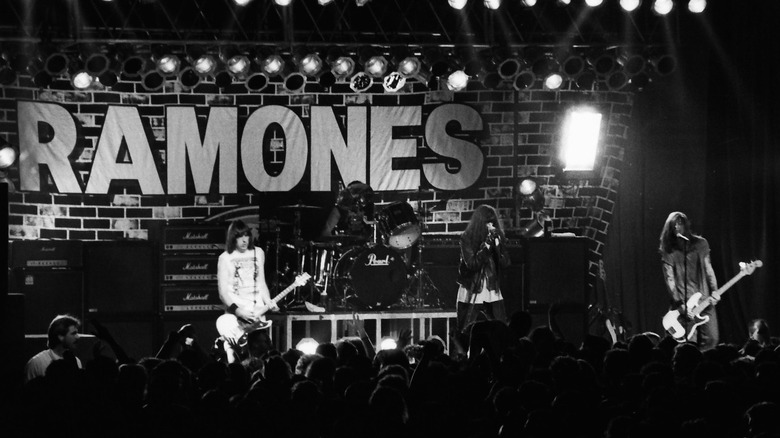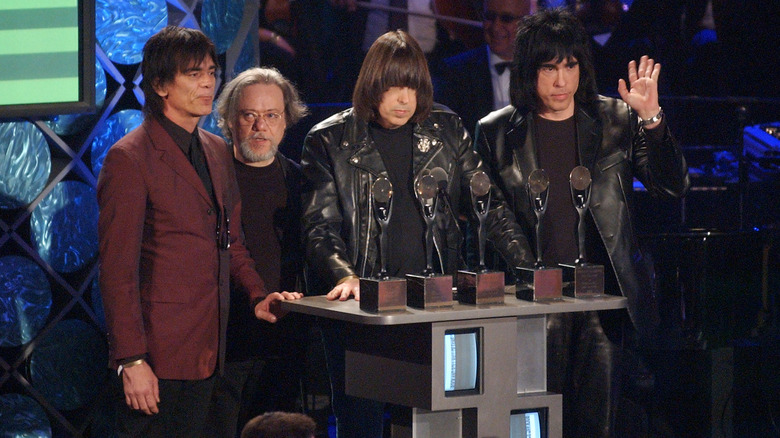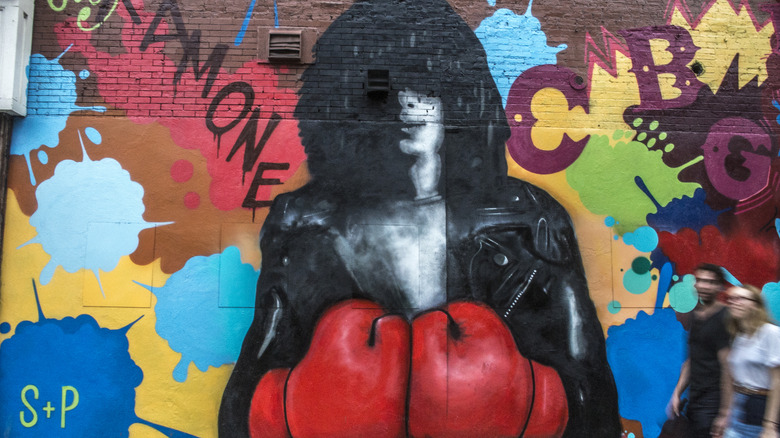Tragic Details About Joey Ramone
It's human nature to want to leave a legacy behind, to leave a mark on the world that turns it into a better place for future generations. And the Ramones? They definitely did that, by elevating punk rock to an art form and reminding everyone not only what music could sound like, but what it could feel like.
By 1990, the Ramones had been around long enough to be able to look back on their career — and around them, at the impact they'd had on the music scene. When frontman Joey Ramone sat down with Entertainment Weekly, he made it clear what he saw his impact as being: "We ... turned the world around, totally revolutionized rock & roll, and went to England, and that's when the whole British thing kicked off, and then the world changed completely. And everybody basically was inspired by us to some degree."
He acknowledged his own inspirations — particularly, The Who — and spoke a bit about their goals. They'd wanted to make music fun again, fast-paced and exciting. They'd wanted to change lives and perceptions, and ultimately, their influence can be seen across the music and acts that came after them. It wasn't all fun and games, though, and the roads that the Ramones walked were sometimes very dark indeed.
He was born with a rare tumor that caused lifelong problems
Joey Ramone wasn't always Joey Ramone. He started out as Jeffrey Hyman, and according to those who knew him best, his troubles started the moment he was born.
The future Ramone lead singer and punk rock pioneer was born with a rare type of tumor on his spine. The growth was a particular type called a teratoma, which occurs when there's a problem with the way cells mature and turn into specialized cells. Ramone's growth was removed while he was still an infant, but it's been suggested that it had lifelong complications.
His brother, Mickey Leigh, explained to Classic Rock: "He was prone to infections because his neurological system was not right. If he stepped on something and cut his foot, he would wind up in the hospital on intravenous antibiotics. He was always going to the doctors." In addition to his susceptibility to infection, the tumor was also blamed for his chronic poor circulation, which could lead to problems like numbness, muscle aches, and constantly cold fingers and toes.
He had a challenging relationship with his parents
Growing up was filled with conflict for Joey Ramone and his brother: Rolling Stone says that their father, Noel, was renowned for his temper, telling how he had once thrown his son clear across the room.
Mickey Leigh related more of what it was like growing up in the Hyman household in his book, "I Slept with Joey Ramone: A Family Memoir." In it (via The Village Voice), he wasn't too gracious when it came to his father, who was described in straightforward yet un-reprintable words. Leigh recalled that he was still young when his parents divorced, but their parents' split had an impact on them, too — beyond the confines of the home.
It was, after all, a different time, when divorce was not so prevalent or accepted. When he gave The New York Times a tour around the Forest Hills neighborhood where they had grown up, he recalled, "It was tough for us. Our parents got divorced when I was like 4. That was not acceptable here at the time. We were instantly branded. ... My father wanted her in the kitchen. She didn't want to be in the kitchen." Their mother, Charlotte, was just as enmeshed in New York City's culture as her sons would be: She would later invite them to rehearse in the basement of her art gallery. By that time, though, her new boyfriend had already kicked him out of the house.
If you or someone you know is dealing with domestic abuse, you can call the National Domestic Violence Hotline at 1−800−799−7233. You can also find more information, resources, and support at their website.
He was bullied as a teenager
Ramones manager Monte Melnick wrote "On the Road with the Ramones," and gave a behind-the-scenes glimpse into not only the band, but the individual personalities that made it such a unique thing. He quotes Joey Ramone as summing up his childhood like this, "I was a misfit, an outcast, a loner. I didn't get along with the other kids, and I didn't like the other kids. I didn't like Queens, 'cos it wasn't me. I only had a couple of friends and I didn't fit in there."
He recalled always being a target for the guys who would cruise the streets just looking for a fight, and said that when he was younger, his height always made him stand out as precisely the sort of target they were looking for.
It wasn't just in New York, either. When Classic Rock took a retrospective walk down memory lane through the lives of all of the Ramones, they recalled how Joey headed off to San Francisco when he was 18. The idea was that he was going to opt for following the era's hippie lifestyle, but that dream soon turned into a nightmare: He was robbed, left penniless, and forced to return home.
He lived with undiagnosed conditions
It was Tommy Ramone who explained to Uncut that a huge part of what made the Ramones so relatable was their very distinct personalities — and early lyrics that talked about things that weren't usually songwriting material. Namely, mental illness. He described what it was like to be in the midst of it: "It was like being in a Picasso painting, everything was sideways."
At the height of the Ramones' heyday, Joey Ramone was dealing with severe obsessive-compulsive disorder. And at the time, he was undiagnosed, which led to his bandmates not knowing what was going on with him, or how to deal with the things that he was convinced that he needed to do. Manager Monte Melnick explained: "... everybody thought he was out of his freaking mind. He couldn't help himself, he had to touch the door knob six times, walk on the curb then walk off the curb." Tensions within the group were made worse by instances where everyone was forced to wait for him, while he carried out a series of increasingly elaborate rituals.
In addition to undiagnosed OCD, it's also been famously suggested that Joey also had Marfan syndrome. Marfan syndrome most obviously impacts a person's stature: Joey's height and build — along with his long arms and fingers — were believed to be indicators of the condition. Marfan comes with a wide variety of potential complications, including a weakened heart, problems with eyesight, and skeletal abnormalities.
If you or someone you know needs help with mental health, please contact the Crisis Text Line by texting HOME to 741741, call the National Alliance on Mental Illness helpline at 1-800-950-NAMI (6264), or visit the National Institute of Mental Health website.
His addictions made Dee Dee Ramone consider quitting
Dee Dee Ramone got candid in his memoir "Lobotomy: Surviving the Ramones," and part of what he talked about was how the fun of touring and making music quickly turned into just another job. He was honest, too, about his drug and alcohol use, saying that as soon as he had started to consider quitting, "Joey started drinking seriously."
He recalled just how bad it got, saying that they'd have to drag him out of bars. Dee Dee recalled nights when Joey would harass others for drugs, and pick fights when they said they didn't have any. "... one of the reasons I considered stopping doing cocaine was because [Joey] reminded me of myself. I saw how ugly it got..."
Dee Dee wrote that there were scores of instances when Joey's addictions got in the way of what they needed to do. Performances started to suffer, delays became unbearable, and conflict only escalated. He wrote about Joey breaking his nose in a fall, locking himself in bathrooms, and staggering back to hotels shortly before they all needed to be going on stage for a performance — which often got started late. "'Can he sing? Will he be able to sing?' That was the constant worry."
If you or anyone you know needs help with addiction issues, help is available. Visit the Substance Abuse and Mental Health Services Administration website or contact SAMHSA's National Helpline at 1-800-662-HELP (4357).
Johnny Ramone married the love of Joey's life
If there's anything that's more legendary than the music of the Ramones, it's the conflict between members. That was particularly true of the hatred that flared between Johnny and Joey, and in her memoir "Poisoned Heart: I Married Dee Dee Ramone," Vera Ramone King recounted how their falling-out happened in a painfully public way on their 1980 European tour.
Going along with them on the tour was Vera, Johnny's girlfriend, Roxy, and Joey's girlfriend, Linda (pictured). Vera wrote: "It was obvious to everyone that there was something going on between Johnny and Linda. ... By the time we were in Belgium, they were coordinating their outfits! ... we all noticed that Linda and John were wearing matching peach-colored sweatshirts. ... I could see the anguish in Joey's eyes; he was helpless against John." Later, Vera wrote about how devastated Joey was when Linda officially left him, saying that he went from girlfriend to girlfriend, and either breaking up with them or quickly finding off that they were better being friends.
Linda and Johnny ended up getting married, staying together until his death in 2004. She spoke with Fox News about the relationship and how she reconnected with Joey years later. She said: "It was our first love, me and Joey. So it was very deep and it was amazing. But at one point, Johnny fell in love with me... So when it came time for Joey and me to break up, we understood. It was time to move on."
He lamented music becoming a business
In 2021, The Ramones' YouTube channel published the last known interview that Joey Ramone ever did. It took place in December of 2000 (just over a year before his death), and in it, he didn't pull any punches when he was asked about what he thought of the current state of radio and music. For starters, he said he would change everything about what radio had become, a far cry from the radio of the 1960s: Music had gotten too corporate, with stations unwilling to play enough of the edgy stuff. And he saw it continuing to be that way, while lamenting the loss of freedom and creativity.
He'd felt that way for a while, too. In 1995, he spoke with the Los Angeles Times around the time of the official break-up of the Ramones. He said that while he was grateful that they were finally being recognized for their impact on the music scene, he added that he saw something different even in the edgier stuff of the time.
"I see music today as more of a business than ever before. When I was a kid, growing up in the '60s, music was an outlet for enlightenment, frustration, rebellion. It was more about individualism. Today, it's just like a big business." While there were some groups out there that he did appreciate — like Hole — he condemned what he heard as a formulaic sound that was becoming the new popular thing.
He died before he threw the 50th birthday party he was planning
Joey Ramone died on April 15, 2001: He was just 49 years old, and a few months later, his longtime friend (and music journalist) Dr. Donna Gaines wrote a retrospective for SPIN. She covered the last few months of his life, and shared that he had been diagnosed with lymphoma all the way back in 1995. He had changed his lifestyle, she wrote, focused on eating — and being — healthier, while making music and encouraging those trying to follow in the footsteps of the Ramones. When he died, he had been in the middle of planning a massive party to celebrate his 50th birthday.
While his obituary shared a retrospective of his career, Gaines's piece for Spin was perhaps a more Ramones-like tribute: She wrote candidly of how those who visited him in the hospital had no idea if he would be languishing in pain, or laughing when they got there. Even though he had kept his diagnosis a secret, it had taken a toll on him, and the infections he had been susceptible to for his entire life were no longer responding to antibiotics.
Gaines wrote: "He was rich and famous, but in his heart he still understood the misfit's suffering, the festering rage that drives kids to self-destruction and Columbine. By simply being himself, Joey stuck up for all the kids who didn't fit in, who felt shut out, put down, and alone."
His OCD contributed to his death
Joey Ramone's official cause of death was lymphatic cancer, but according to The British Journal of Psychiatry, the series of events that led to his final stay in the New York Weill Cornell Medical Center was directly related to his obsessive-compulsive disorder.
Joey had long felt beholden to complete a series of rituals, and he had been coming back from a doctor's appointment when he became convinced that he hadn't closed the door behind him when he left the appointment. Heading back across town, he slipped, fell, and broke his hip.
According to what Dr. Donna Gaines wrote for SPIN, the years of treatments had made his bones incredibly brittle and prone to fracture. At the time of his fall, he was in remission: The broken hip — compounded with the extreme stress of the recent death of his father — would ultimately prove too much. Tributes flooded in, including one from Ronnie Spector, who said, "Rock has lost its most generous soul."
His Hall of Fame award went unclaimed
The Ramones were inducted into the Rock & Roll Hall of Fame in 2002, and there's a bit of irony here. Performing the induction ceremony was Pearl Jam's Eddie Vedder, in spite of the fact that several years before, Joey Ramone had used them to describe what he thought was wrong with music. He told the LA Times: "... there's a whole slew of bands that have just really bought into the system, the whole business of it, the formula ... all these bands that sound like Pearl Jam. There's this whole formula sound goin' on ..."
The actual induction ceremony didn't go off without a hitch, either. Joey had died about a year before the induction, and everyone had sort of forgotten to appoint someone to accept the award on his behalf. That meant that when the induction was over and the other Ramones left with their statues, the one for Joey was left sitting on the podium.
It took a whopping eight years for Dan Fields — the band's early manager — to team up with the Rock & Roll Hall of Fame's president, Joel Peresman, in an attempt to give Joey the same honors that his bandmates received. Fields accepted the award in Joey's honor, saying (via Observer) that it hadn't been done on purpose, and was an accidental oversight. He added: "I think he would have enjoyed the mistake ... why we're here. I think he's chortling at this minute."
His estate was the subject of a bitter lawsuit
Joey Ramone's death was followed by the deaths of the other Ramones: Dee Dee Ramone died in 2002, Johnny Ramone died in 2004, and Tommy Ramone in 2014. Rest in peace? That didn't exactly happen, as several of the Ramone heirs were mired in a legal dispute so bitter that arbitrator Bob Donnelly described it (via Billboard) as "a feud worthy of the Hatfields and McCoys, but unworthy of the highly esteemed Ramones brand."
On one side was Joey's brother, Mitchel Hyman (a.k.a. Mickey Leigh). On the other? Johnny's widow (and Joey's ex-girlfriend), Linda Cummings-Ramone. Hyman and Cummings-Ramone had each inherited half of the company established to oversee the Ramones' legacy, and to say they didn't see eye-to-eye was an understatement. Among their grievances was Hyman's claims that she was "exploiting Ramones Intellectual Property for her own purposes... personal financial gain, self-adornment and benefit," while she claimed that he was wrongfully trying to block her from using that same intellectual property.
A settlement was reached in 2019, but to what lasting extent remained to be seen: The arbitrator suggested that in order for the legacy of the Ramones to be preserved, there needed to be "some radical changes made by Mickey, Linda, and their representatives and the way they all conduct the business of the company."
